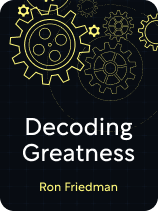

This article is an excerpt from the Shortform book guide to "Decoding Greatness" by Ron Friedman. Shortform has the world's best summaries and analyses of books you should be reading.
Like this article? Sign up for a free trial here.
What would you like to get better at? Do you regularly ask for feedback? What types of feedback do you find most helpful?
Workplace performance psychologist Ron Friedman wants you to find creative success. In his book Decoding Greatness, he shows how good feedback is part of the equation. He discusses what makes feedback good, how you should ask for it, and how to be receptive to it.
Read on to learn how to use feedback to improve performance.
Soliciting Helpful Feedback
Friedman argues that most feedback is unhelpful because it’s too vague, often taking the form of “I liked it” or “I didn’t like it,” and it can easily swing between extremes of supportiveness or criticism. Instead, Friedman argues that good feedback needs to be:
- Specific—reviewers should point to concrete strengths and weaknesses in the work.
- Actionable—the point of feedback is to help you improve, so it needs to point toward a plan for doing so.
In his advice on how to use feedback to improve performance, Friedman recommends that you point your reviewer to specific aspects of the work that you’re concerned about or deem critical. Don’t just ask, “What do you think?” or “Do you like this?” Instead, ask, “Does the third verse make the song too long?” or “Do I strike the right tone in this application letter?”
Similarly, Friedman recommends that you reframe critical feedback as steps for improvement. For example, if your test audience tells you that the conclusion of your film is too ambiguous, you might consider adding a voiceover by the main character to clarify the action.
| An Alternative Perspective: The Three Types of Feedback Friedman suggests that for feedback to be useful, it needs to guide you toward concrete ways to improve your efforts. However, in Thanks for the Feedback, Douglas Stone and Sheila Heen take a different perspective: They describe three types of feedback, all of which they say are valuable: Coaching is when someone gives you advice aimed at improving your future performance. It’s useful because it helps you learn and grow. This is the sort of feedback that Friedman says is best because it’s focused on specific actions you can take to strengthen your work. Evaluation occurs when someone ranks your performance in comparison to expectations and to other people. It’s useful because it lets you know where you stand and tells you what to expect in terms of the consequences of your performance. If someone tells you they “didn’t like” your work, they might be attempting a form of evaluation by letting you know that you didn’t meet their expectations. Appreciation happens when someone thanks, praises, or congratulates you. It’s useful because it makes you feel seen, understood, and valued—feelings that motivate you to keep going. If someone says they “liked” your work, they may be trying to express appreciation by sharing their positivity about what you did. While it would presumably be beneficial for all three types of feedback to be specific, of these three categories, only coaching inherently meets Friedman’s second criterion of actionability. Of course, you could formulate action steps from evaluation or appreciation (such as by reviewing and clarifying the expectations you failed to meet or planning to do more of something that garnered praise)—but actionability isn’t the primary point of these types of feedback. With these three kinds of feedback and their unique benefits in mind, Friedman’s preference for specific-and-actionable may seem overly narrow. Perhaps a better rule for soliciting helpful feedback is to let your reviewer know what type(s) of feedback you’re looking for—as Friedman suggests, “Good job!” isn’t helpful if you’re looking for coaching, but neither is an evaluation of your strengths and weaknesses when all you wanted was some praise. |
Receiving Feedback
Friedman points out that, for feedback to be useful, you have to be receptive to it. That means not getting upset or defensive when you receive criticism. Friedman offers two strategies to help with this:
- Get some distance from your work. If you’re too attached to a project—or if it’s all you think about or work on—it can be hard to entertain critical feedback productively.
- If you get critiques that hurt, take the time you need to process your emotions before you respond. Don’t get defensive, give up, or change things reactively.
(Shortform note: In addition to getting distance and taking time to respond, another way to deal with painful feedback is to examine the source of the emotions you’re feeling. In Thanks for the Feedback, Stone and Heen argue that there are three emotional triggers that make receiving feedback hard: Truth triggers activate when we think the content of the feedback is incorrect or unfair. Relationship triggers happen when we take issue with the person giving us feedback rather than the feedback itself. Identity triggers come into play when feedback threatens our sense of self. Like Friedman, Stone and Heen argue that you need to address each of these emotional reactions before you can take the feedback on its own merits.)

———End of Preview———
Like what you just read? Read the rest of the world's best book summary and analysis of Ron Friedman's "Decoding Greatness" at Shortform.
Here's what you'll find in our full Decoding Greatness summary:
- The secret shortcut to elite performance and creative innovation
- How to reverse engineer someone else's work to create your own
- How to lower the stakes of failure by mitigating your creative risks






